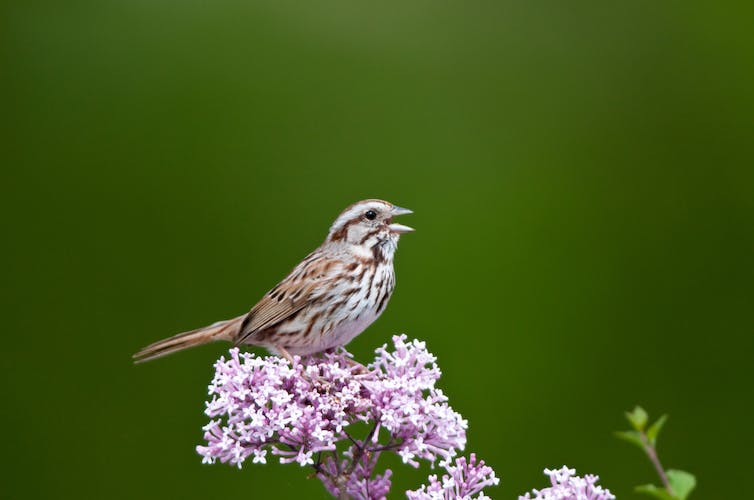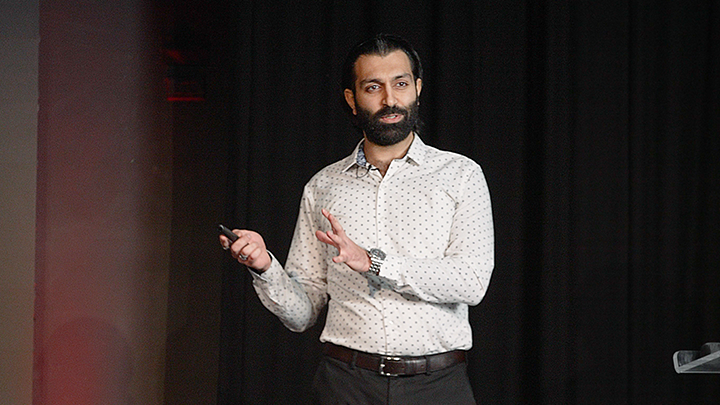Postdoc Spotlight: Dr. Leanne Grieves

Birds sniff out potential mates who are genetically different
Leanne Grieves, McMaster University
I’ll never forget the heady scent of Cindy, my first major crush. Sometimes, I catch a whiff of her Hawaiian Ginger Body Mist perfume and I’m transported 15 years back in time and straight into a darkened club. Calgon, take me away.
Many of us have experienced the power of a nostalgic scent triggering our memories. Of course, our sense of smell doesn’t only serve to remind us of our long-lost loves. Smell can inform us of the presence of enticing food nearby, or it can warn us of dangerous toxins in the environment. We can even smell when our companions are ill.
Our body odour is affected by many factors. The food we eat, our stress levels, if we are healthy or sick, the bacteria and fungi that naturally live on our bodies and even our genetic makeup can all affect the way we smell.
Avian body scent
But what does this have to do with birds?
Much like the phrase “blind as a bat” (bats can see quite well, thank you), there is a persistent myth that birds can’t smell. In the 1820s, artist and ornithologist John James Audubon wrongly claimed that vultures use sight over smell to find food. Audubon’s conclusions were flawed, but the myth lingers on.

Researchers have shown that birds use smell to do all sorts of things, like find food, avoid predators, protect their nests, distinguish relatives from nonrelatives and identify their parents.
Our feathered friends have a special preen gland at the base of their tail. When birds rub the gland with their beak, it releases preen oil, which they groom themselves with. Preen oil helps waterproof and protect feathers from damage, but it is also a major source of bird body odour.
Does a bird’s body odour have a purpose? I wanted to know whether birds feel attracted to each other because of how they smell, like I did with Cindy’s perfume.
By gently squeezing the preen gland, I collected preen oil from a common North American bird called the song sparrow (Melospiza melodia melodia), brought them in to captivity, and gave them a choice between preen oil from males and females. Males spent more time with preen oil from females, and females spent more time with preen oil from males, suggesting that birds prefer the smell of the opposite sex. This is probably because the sparrows were looking for mates to start a family with.

Smell the difference
Birds, like humans, are more likely to raise a healthy family if their mate is genetically unrelated to them. But how can we assess whether a potential partner is a good genetic match?
Our B.O. may hold the key.
Believe it or not, in the 1990s, researchers convinced a group of women to rate their preferences for the smell of men’s dirty shirts. This “sweaty t-shirt experiment” showed that women prefer the B.O. of men who are genetically different from themselves.
Read more: The smelly truth about romantic relationships and health
More recently, researchers showed that there is a link between bird scent and bird genes, suggesting that genetically dissimilar birds smell different than genetically similar birds.
I wanted to know whether birds, like humans, prefer the odour of genetically dissimilar partners, so I designed my own sweaty t-shirt experiment. I gave female song sparrows a choice between preen oil from males who were more or less genetically similar to themselves. Just like in the human study, female birds preferred the smell of genetically dissimilar males.
What’s more, I gave male birds the same test and got the same result: males preferred the smell of genetically dissimilar females.
Birds and humans both prefer the scent of a genetically different partner. This can help us ensure our offspring are healthy and able to fight off harmful pathogens.![]()
Leanne Grieves, McCall MacBain Postdoctoral Fellow, Dept. of Psychology, Neuroscience & Behaviour, McMaster University
This article is republished from The Conversation under a Creative Commons license. Read the original article.



